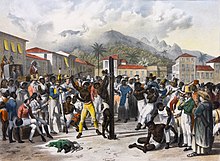Corporal punishment
punishment which is intended to cause physical pain to a person
Corporal punishment or physical punishment is a punishment intended to cause physical pain on a person. It is most often practised on minors, especially in home and school settings. Common methods include spanking or paddling. It has also historically been used on adults, particularly on prisoners and enslaved people. Other common methods include flagellation and caning.


Quotes
edit- Spare the rod and spoil the child.
- One of the oldest of English proverbs, c. AD 1000, borrowed from the Latin
- Cited in: Bergan Evans, ed., Dictionary of Quotations (1968), p. 596
- Qui parcit virgæ odit filium.
- Proverbs, XIII, 24 (Vulgate)
- Cited in: W. F. H. King, ed., Classical and Foreign Quotations (1904), no. 2312
- He that spareth the rod, hateth his son; but he that loveth him, chasteneth him betimes.
- A fool's lips enter into contention, and his mouth calleth for strokes.
- Proverbs, XVIII, 6 (KJV)
- Chasten thy son while there is hope, and let not thy soul spare for his crying.
- Proverbs, XIX, 18 (KJV)
- Judgements are prepared for scorners, and stripes for the backs of fools.
- Proverbs, XIX, 29 (KJV)
- Foolishness is bound in the heart of a child; but the rod of correction shall drive it from him.
- Proverbs, XXII, 15 (KJV)
- Withhold not correction from the child; for if thou beatest him with a rod, thou shalt deliver his soul from hell.
- Proverbs, XXIII, 13–14 (KJV)
- A whip for a horse, a bridle for an ass, and a rod for a fool's back.
- Proverbs, XXIX, 15 (KJV)
- Ὃ μὴ δαρεὶς ἄνθρωπος οὐ παιδεύεται.
- He that will not be flogged will never be educated.
- Menander, Monosticha, 422
- Motto of Goethe's Dichtung u. Wahrheit.
- Cited in: Classical and Foreign Quotations (1904), no. 1888
- He that will not be flogged will never be educated.
- Adsit Regula, peccatis quæ pœnas irroget æquas
Ne scutica dignum horribili sectere flagello.- Be just: and mete to crime its condign pain;
Nor use the murd’rous lash where suits the cane.- Horace, Satires, 1, 3, 117
- Cited in: Classical and Foreign Quotations (1904), no. 39
- Be just: and mete to crime its condign pain;
- Aut disce, aut discede: manet sors tertia cædi.
- Learn, Leave, or be Licked.
- Inscription on a large board in the schoolroom of Winchester College. Over Disce are represented the rewards of learning—mitre and crosier; over Discede the symbols of the alternative professions of the army and the law; and over Cædi the "bibling-rod" of four apple twigs.
- Cited in: Classical and Foreign Quotations (1904), no. 194.
- See also: A. F. Leach, History of Winchester College (London, 1899), p. 123.
- Learn, Leave, or be Licked.
- He that will not use the rod on his child, his child shall be used as a rod on him.
- Thomas Fuller, The Holy State (1642), Ch. 5. The Good Parent
- Cited in: Dictionary of Quotations (1968), p. 597
- When Johnson saw some young ladies in Lincolnshire, who were remarkably well behaved, owing to their mother’s strict discipline and severe correction, he exclaimed, in one of Shakespeare’s lines, a little varied,‘Rod, I will honour thee for this thy duty.’At a subsequent period, he observed to Dr. Rose, ‘There is now less flogging in our great schools than formerly, but then less is learned there; so that what the boys get at one end they lose at the other.’
- Samuel Johnson, in J. P. Briscoe, ed., Dr. Johnson's Table Talk (London: Gay & Bird, 1900), p. 110
- All the learnin’ my father ever paid for was a bit o’ birch at one end and the alphabet at th’ other.
- George Eliot, The Mill on the Floss (1860), said by Mr Tulliver
- Somebody ought to make a historical study of—the relation between theology and corporal punishment in childhood. I have a theory that, wherever little boys and girls are systematically flagellated, the victims grow up to think of God as ‘Wholly Other’—isn’t that the fashionable argot in your part of the world? Wherever, on the contrary, children are brought up without being subject to physical violence, God is immanent. A people’s theology reflects the state of children’s bottoms. ... Look at the Hebrews—enthusiastic child-beaters. And so were all good Christians in the Age of Faith. Hence Jehovah, hence Original Sin and the infinitely offended Father of Roman and Protestant orthodoxy. ... Major premise: God is Wholly Other. Minor premise: man is totally depraved. Conclusion: Do to your children's bottoms what was done to yours, what your Heavenly Father has been doing to the collective bottom of humanity ever since the Fall: whip, whip, whip!
- Aldous Huxley, Island (1962), quoted in Ram Swarup, On Hinduism: Reviews and Reflections (2000), Ch. 5